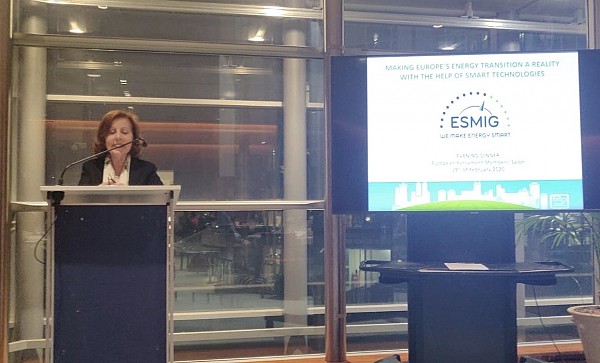Work in Parliament ESMIG Dinner: Making Europe's energy transition a reality with the help of smart technologies, Brussels
ESMIG organised an evening of discussion at the European Parliament Members’ Salon exploring how to make Europe’s energy transition a reality with the help of smart technologies.
Maria da Graça Carvalho co-hosted the event together with other Member of the European parliament: Mr Ville Niinistö MEP (Greens/FI) and Ms Claudia Gamon MEP (Renew/AT). The event gathered a cross-national and cross-party group of MEPs, policy experts and ESMIG members engaged in the energy transition towards a digitalised, decentralised, consumer focused energy system integrating renewables.
Maria da Graça Carvalho began by appreciating the timing of the discussion as the European Commission released, among others, the White Paper on artificial intelligence and the EU Data Strategy on the same day. She remarked that these new EU stances are not only of high importance for the next five years, but also crucial for the upcoming 25 years as they are going to transform the way the EU industry and the European economy, and society as a whole, function. She continued by highlighting the role the energy sector has played as a precursor in collecting data for the public benefit and added that the recently released EU Data Strategy is adopting a similar approach to other policy areas.
For Maria da Graça Carvalho, data analysis is a primary tool for overcoming the challenges the European economy and society are faced with and she expressed the hope that the new multiannual financial framework of the European Union will be aligned to the priorities of the new European Commission regarding both the digital and energy transition. Graça Carvalho stated that the discussion on the budget gives a window of opportunity to implement policy actions for sectors which are technologically developed. On the Clean Energy Package, she mentioned that “Member States are now in the best conditions to foster the shift from a consumer-centred approach to a ‘prosumer’- centred approach, namely the setting in which citizens are both consumers and producers of energy.”
In fact, Maria da Graça Carvalho explained as well that fostering of energy communities and any other decentralised ways of energy production results in the empowerment of European citizens. And stated that the digital transformation should align with the shift from consumer to “prosumer” as both phenomena are strictly related to the EU Green Deal as a means to fight climate change. She also pointed out that the use of smart meters and their uptake by European citizens is central to this approach as data analysis is the foundation for science-based decisions. Graça Carvalho concluded with a renewed plea for an EU budget that will comply with the needs of the digital and energy transformation, as also highlighted by the recently released Commission’s documents.
